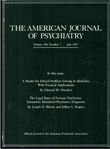Relationship of psychological processes during delirium to outcome
Abstract
To determine which psychological processes during delirium might correlate with and predict postdelirium psychological outcome, the authors prospectively studied 34 burn patients who became delirious during hospitalization. After the delirium resolved, seven of the 25 survivors had severe psychological symptoms--either depression or posttraumatic stress disorders. During delirium, this outcome group was clinically distinctive: They showed significantly more preoccupation with their trauma and injury, had greater anxiety and fear, and differed in their use of defensive operations. These findings suggest modifying the standard approach to the delirious patient.
Access content
To read the fulltext, please use one of the options below to sign in or purchase access.- Personal login
- Institutional Login
- Sign in via OpenAthens
- Register for access
-
Please login/register if you wish to pair your device and check access availability.
Not a subscriber?
PsychiatryOnline subscription options offer access to the DSM-5 library, books, journals, CME, and patient resources. This all-in-one virtual library provides psychiatrists and mental health professionals with key resources for diagnosis, treatment, research, and professional development.
Need more help? PsychiatryOnline Customer Service may be reached by emailing [email protected] or by calling 800-368-5777 (in the U.S.) or 703-907-7322 (outside the U.S.).



